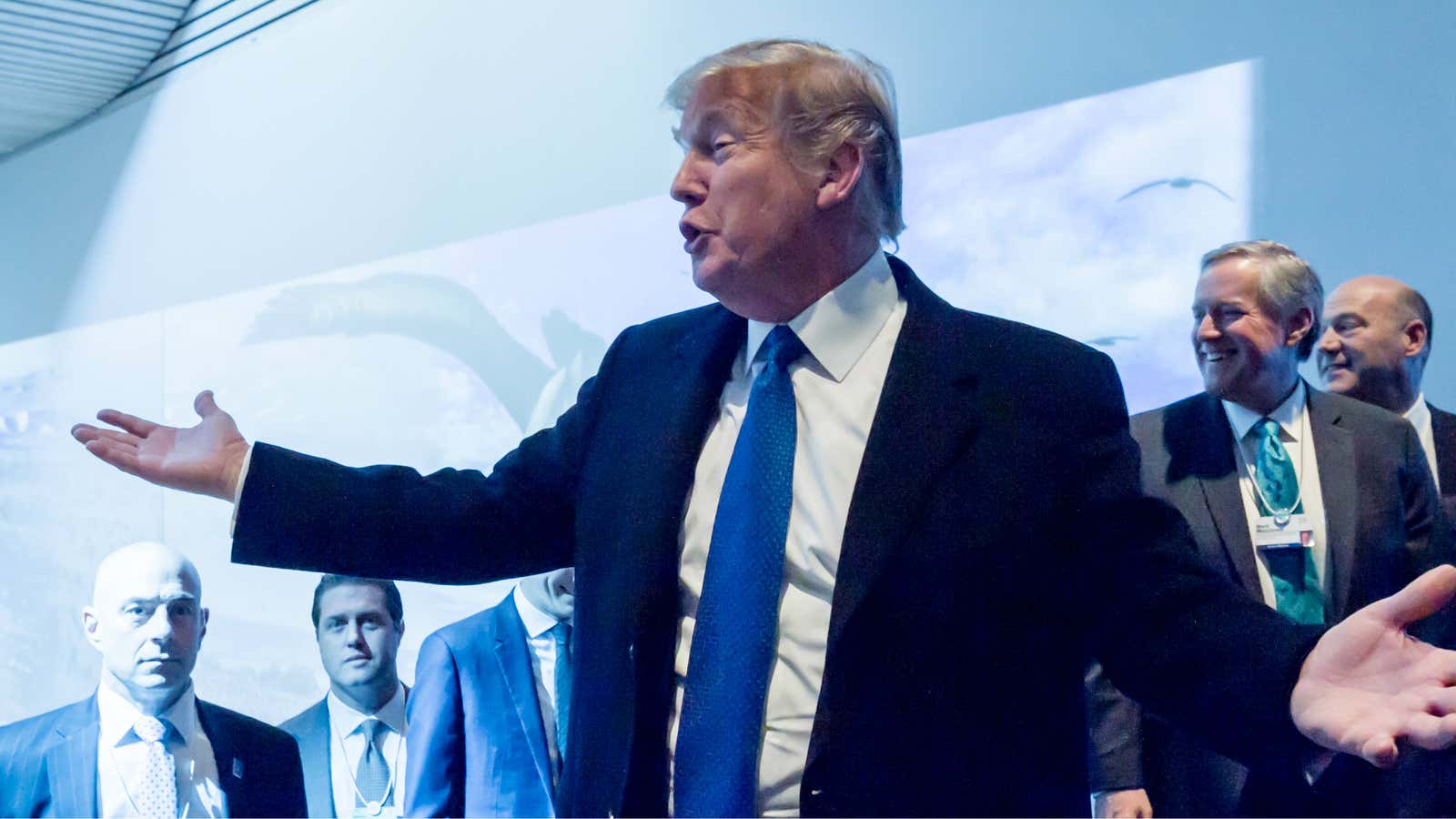Last week, US president Donald Trump addressed nearly 2,000 people attending the the World Economic Forum’s annual meeting in Davos, Switzerland. This annual event is the epicenter for government officials and corporate titans who schmooze and do deals. In sessions during the week, they lauded Trump’s tax cuts as being business friendly, as well as good for them personally.
Even so, Davos is also known for its discussions about inequality and fractured societies and a considerable agenda of NGO events. As an attendee myself, I wondered how the NGO officials, union leaders and socially minded business people would respond to Trump, especially given his “shithole” comments.
In the days leading up to Trump’s talk, there were rumors that all the African leaders would walk out together and that the Young Global Leaders would too. I asked around but no one seemed to know. Ever since I had heard that Trump was coming to Davos I had wondered what kind of protest I could do. I didn’t know what would be possible given the tight security, but finally decided to don a “not my president” t-shirt.
Feeling a bit afraid, on the day of the Trump speech, I put it on—under a turtle neck. I didn’t know how tough Swiss security was, whether I would be arrested or heckled, but I showed up early at the Congress Center and noticed floods of people leaving, including many who said they couldn’t stand to watch him.
After lining up for more than an hour, I got inside. Trump began speaking and I looked around. No one was booing and no one was leaving. I kept waiting for a sign that someone somewhere was protesting, but none came. To the contrary, much of the audience seemed supportive. What if I showed my shirt, got arrested and no one knew it had happened?
Eventually, I took a breath and stood. I walked slowly out of the room, stopping to catch people’s eyes, hoping they would take pictures. I got outside and was grabbed immediately by a security guard who put his hand on my arm. Just as quickly, another guard grabbed him and told him to let go.
There were dozens of journalists and photographers waiting for the speech to end. They interviewed me, and I met another woman, Sasha Kramer, who had had a similar idea: she was wearing a white T-shirt that said “I stand with Haiti” and walked out during Trump’s speech. Despite the rumors, there had been no massive boycott or walkout. It was just the two of us.
Wearing a t-shirt and walking out of a speech at a conference in Switzerland is about the mildest forms of protest possible, and yet no one else did it. Since Friday, I have been wondering why. Many people congratulated me, and a Swiss man even sent an email saying, “I am grateful for your turn to action when most everybody else shut up. Including all my Swiss co-citizens who would have had an opportunity to make a statement in Davos.” Yet at the moment of the speech, no one made a gesture (although there was some booing, especially after Trump attacked “fake news”).
“Yesterday it was all adrenaline and today I am in shock at the way the most powerful people in the world chose greed over compassion,” Sasha Kramer wrote to me over the weekend.
Greed, of course played a part in the crowd’s acquiescence, but I think there were other reasons no one else protested, too:
- Self selection. Many of the people who could not stand to see Trump’s speech—including a group of union officials—left the WEF a day early or stayed in their hotel rooms. The people that went included corporate types who like his business-friendly, short term policies.
- Fear. African leaders may need financial aid or trade deals. Trump’s vindictive nature is well known. Crossing him could hurt their countries.
- Good manners. Many of the delegates have been attending WEF for years and don’t want to offend their host, Klaus Schwab. Others came on WEF Fellowships and felt it would be churlish to walk out of the Trump talk.
- Uncertainty. after I walked out, people came up to me and told me they wished they had too, and that they were sorry they hadn’t brought a shirt . But there hadn’t been a signal to act.
I teach on the impact that digital technology has had on protest and social change and have spoken with protestors from the 2011 Arab and Occupy movements. Over and over again I have heard them say that digital technology helped them realize they were not alone.
Tahrir Square activists Wael Ghonim and Jawad Nabulsi have written about how getting online and seeing how others felt has helped them break through the fear barrier. I guess one of the lessons here is that we are social creatures, and herd behavior matters. Even in the disintermediated world of the internet, unless there is someone willing to take the first step, no one else will follow.
